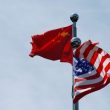Largely confined to the economic sphere. The relationship is determined largely by the Japanese side, based on cold calculation of the assets and liabilities that it brings to Japan. Despite the recent change in the economic and geopolitical situation in the Middle East, Japanese policy is still aimed at finding a comfortable balance between the risks that relations with Israel entail in terms of Japan’s energy supply from the Gulf states and the political and economic advantages that the relationship may bring.
Israeli-Japanese relations began to improve substantially from the 2010s onwards, particularly since 2012, when the late Abe Shinzō’s second term as prime minister began. Under Abe’s eight-year long premiership, Japan implemented a more proactive foreign policy and forged new alliances,[1] fuelled by the premier’s vision of making Japan a great power (again) and growing concerns in Japan about a rising China threat and weakening American presence in Asia. Warming relations with Israel are a component of this new policy although other calculations intrinsic to the Middle East have also come into play and limit Japan’s interest in pursuing a radical change in the relationship.
The improvement in Israel-Japan relations can be seen in the frequent exchange of visits by high-ranking officials and the conclusion of several bilateral agreements. Moreover, during the past few years, Israel has become the target of Japanese investments of unprecedented scale. But does the takeoff during the recent decade indicate a true watershed in the 70-year history of lukewarm Israeli-Japanese relations? Moreover, can we expect Japan’s new strategic policy announced in December 2022[2] to herald a fundamental change in attitude towards Israel? Based on official documents, media sources and interviews with decision-makers, this paper seeks to analyse the current state of the relationship and the obstacles that stand in the way of deeper relations.
A Decade of Change: A Boost in Economic Ties and Beyond
Starting in 2012, the eight-year period under Prime Minister Abe was characterised by a considerable boost in Israel-Japan relations. Conspicuous in the economic sphere, this upturn seems to have endured following Abe’s departure from office in 2020 and well into 2022. There are several components to this shift, most of them the outcome of decisions and actions taken by the Japanese side. In terms of diplomatic exchanges, the decade of the 2010s was unprecedented, with two visits to Israel by Abe (in 2015 and 2018) and a visit to Japan by Prime Minister Benjamin Netanyahu (in 2014).
A Nowruz Present Ayatollah Khamenei Would Have Done Without









